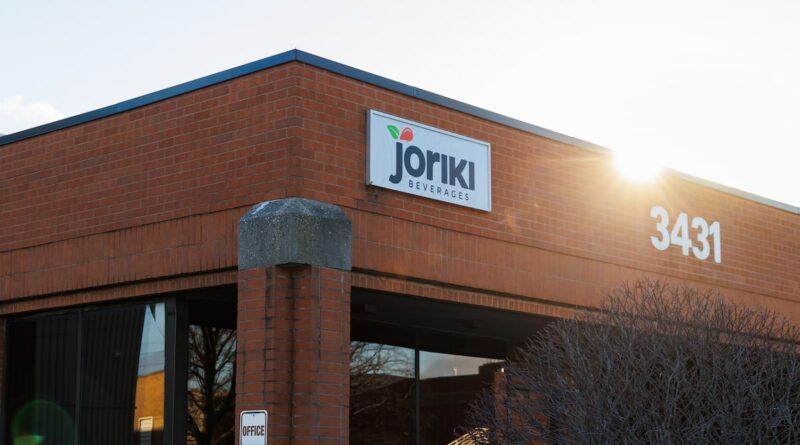Beverage maker linked to listeria outbreak was struggling financially before recall, court filings show
Signage for Joriki Beverages is seen in Toronto on Jan. 8. The Canadian company that processed plant-based milk linked to a deadly listeria outbreak has permanently closed all four of its plants.Cole Burston/The Canadian Press
The beverage manufacturer linked to a deadly listeria outbreak in Canada this summer was struggling financially before a major recall of plant-based milks shut down its largest facility, new court filings show.
Joriki Inc. was contracted by Danone Canada to manufacture almond, soy, coconut and other plant-based milks under the Silk and Great Value brand names, at its facility in Pickering, Ont. However, a nationwide recall was issued July 8 after public health officials linked an outbreak of listeriosis in patients at hospitals and clinics to products made at the facility.
The outbreak led to 20 laboratory-confirmed illnesses, including three deaths. But food safety experts believe the outbreak was larger because listeriosis is often under reported.
Joriki was incurring financial losses from a troubled U.S. expansion prior to the outbreak, the company said in court documents, which left it unable to absorb the financial impact of the recall. Joriki has since sought protection from creditors under the Companies’ Creditors Arrangement Act.
“The recall had a severe negative impact,” Joriki’s chief financial officer Michael Devon said in an affidavit filed as part of the CCAA process.
Along with closing the Pickering site, the recall also led to “production pauses at other facilities, the loss of key customers, significantly reduced revenues, additional costs addressing the recall and a related regulatory investigation, a class action lawsuit and the threat of additional litigation.”
A Globe and Mail investigation last year found the Canadian Food Inspection Agency had not examined the site for safety for several years before the outbreak occurred. The last time a CFIA inspector conducted an on-site visit of the facility was in 2019, but that was for consumer complaints involving mould in products and did not involve checking for listeria, the federal agency said.
When The Globe asked the CFIA when it had last formally inspected the Pickering facility for listeria, the agency could not provide a date.
The Globe investigation found the CFIA had moved to a risk-based approach in recent years that used an algorithm to prioritize inspections. The algorithm determined how often, or not, a facility would be examined. In the years leading up to the outbreak, the algorithm didn’t flag the Pickering facility as a high priority, which meant it never got inspected.
The algorithm relies mostly on information supplied by the companies themselves, The Globe found, which is often not verified by the CFIA, according to current and former inspectors. After The Globe’s investigation was published, federal Health Minister Mark Holland ordered the CFIA to review the algorithm-based system. The process will examine gaps in how the algorithm was designed, and how it should be overhauled.
Joriki has four manufacturing sites: the Pickering facility, its Toronto headquarters, an operation in Delta, B.C., and a location in Pittston, Pa.
Mr. Devon said the company since has tried to sell the business, including machinery and other assets, at its leased Pickering factory, but is unable. The contents are now set to be liquidated in an auction, the court filings say.
Joriki owes more than $209-million to more than 200 creditors, the updated filings show. The company has approximately $2-million in cash.
Joriki’s financial problems began in 2022 when the company mounted an expansion of the U.S. operation, but incurred delays and production difficulties. The company lost $4-million in the fiscal year ending June 30, 2022, on revenue of $139-million. But those losses increased substantially the following year, when Joriki posted a loss of $26.8-million for the year ending June 30, 2023, on revenues of $164-million.
Mr. Devon, a consultant whose firm was hired by Joriki in June to assist with a potential restructuring, was named CFO in early December. He said rising interest rates and delays getting the U.S. factory up to full capacity created a financial burden that became impossible to overcome once the Canadian recall happened.
Joriki placed its operations up for sale in recent months and secured additional funding, but a proposed deal to sell some of its sites fell through, Mr. Devon said.
“Following the loss of a key customer and certain potential purchasers advising the company in late December, 2024, they would not be pursuing transactions, the Senior Lenders advised they were no longer prepared to fund the business as a going concern,” Mr. Devon said.
Among the biggest creditors, Joriki owes $174-million to the Bank of Nova Scotia and $16.1-million to Roynat Capital Inc.
The company has laid off most of its employees, except for a small group to assist in winding down the operations, the documents say. Joriki said it has found a new potential buyer for the assets at its Delta facility, and is in similar negotiations on its Toronto headquarters. The sale of those businesses could preserve jobs if the new buyers choose to keep operating, Joriki said in the filings.
Joriki had 565 full-time and temporary employees, including 337 in Canada. In earlier court filings, Joriki stated it owed $775,000 in unpaid wages and benefits. In the most recent filings, it said those outstanding amounts have since been paid.

